Unit 3 Travel journal单元课件(116张)
文档属性
| 名称 | Unit 3 Travel journal单元课件(116张) |
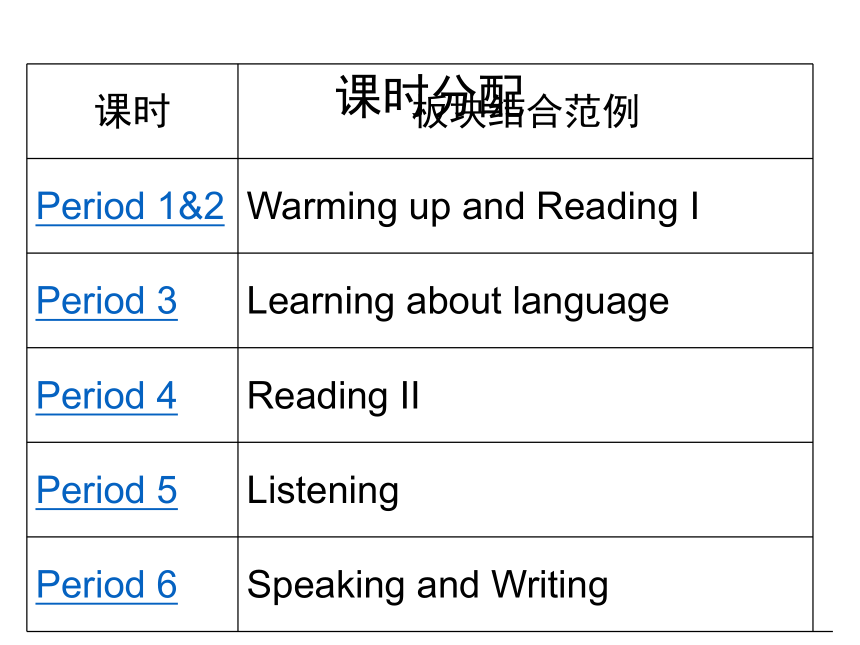
|
|
| 格式 | zip | ||
| 文件大小 | 4.4MB | ||
| 资源类型 | 教案 | ||
| 版本资源 | 人教版(新课程标准) | ||
| 科目 | 英语 | ||
| 更新时间 | 2018-07-08 00:00:00 | ||
图片预览

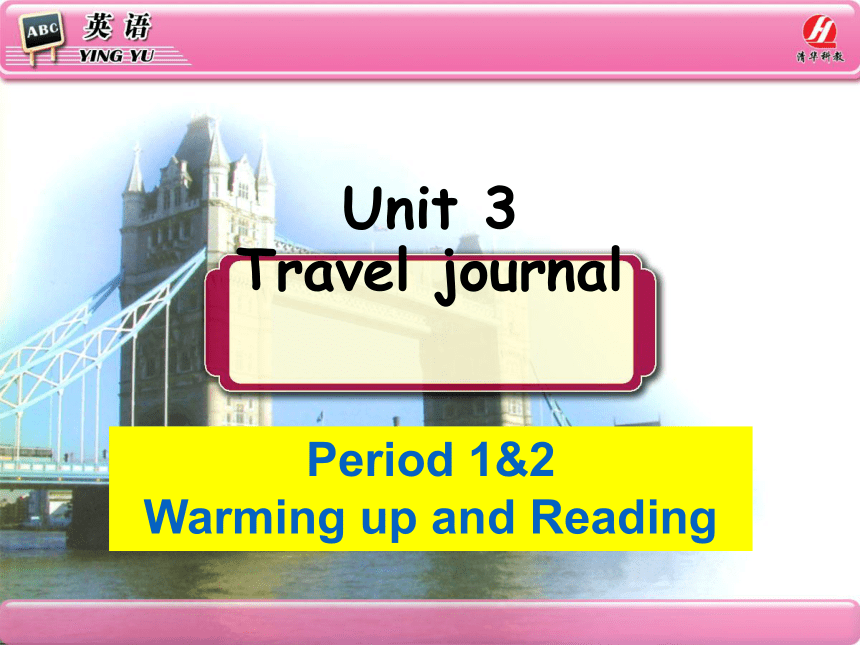
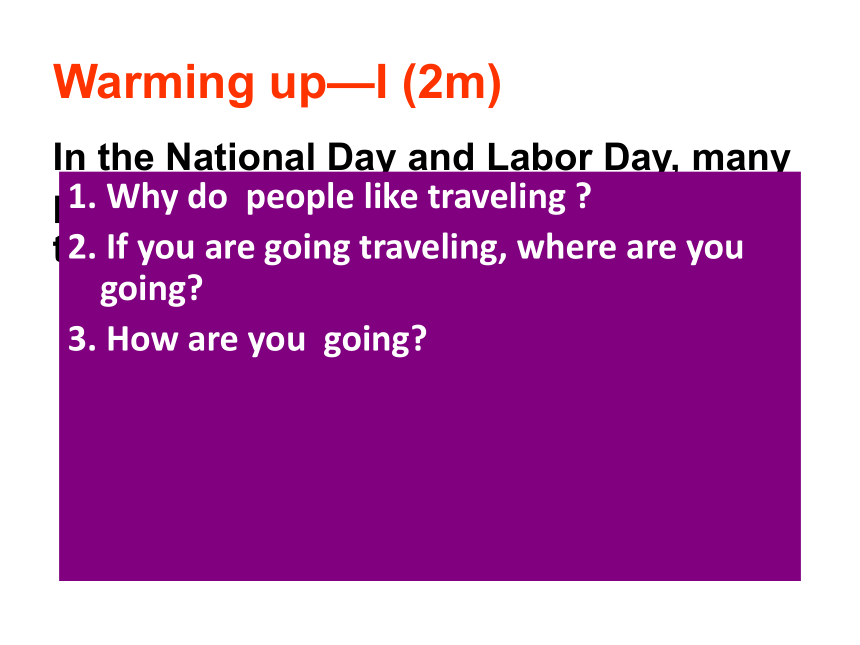
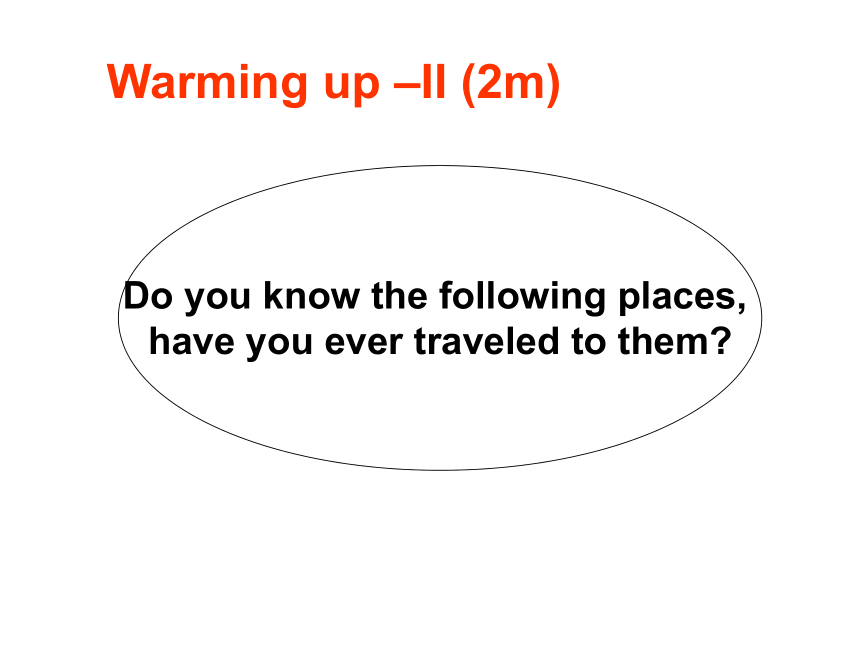
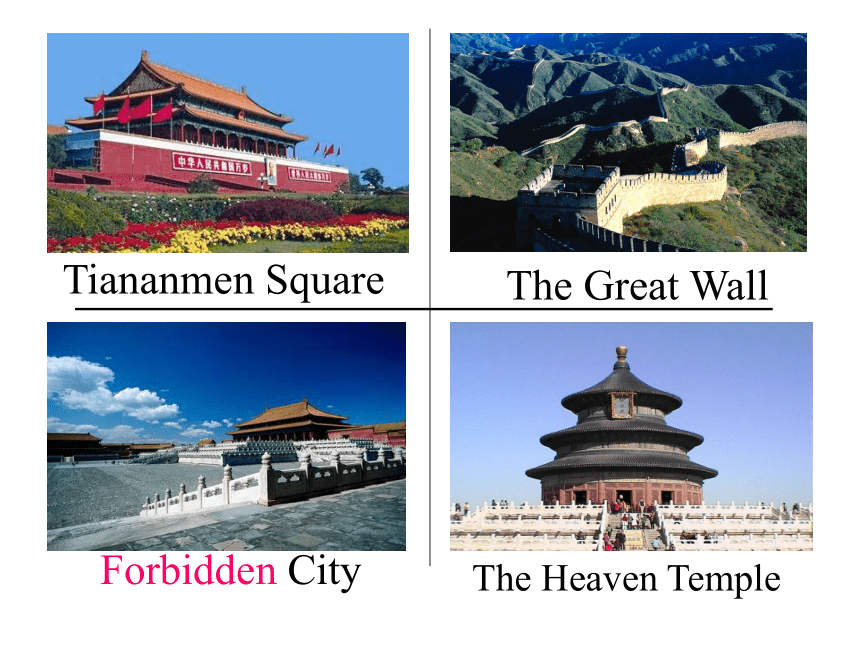
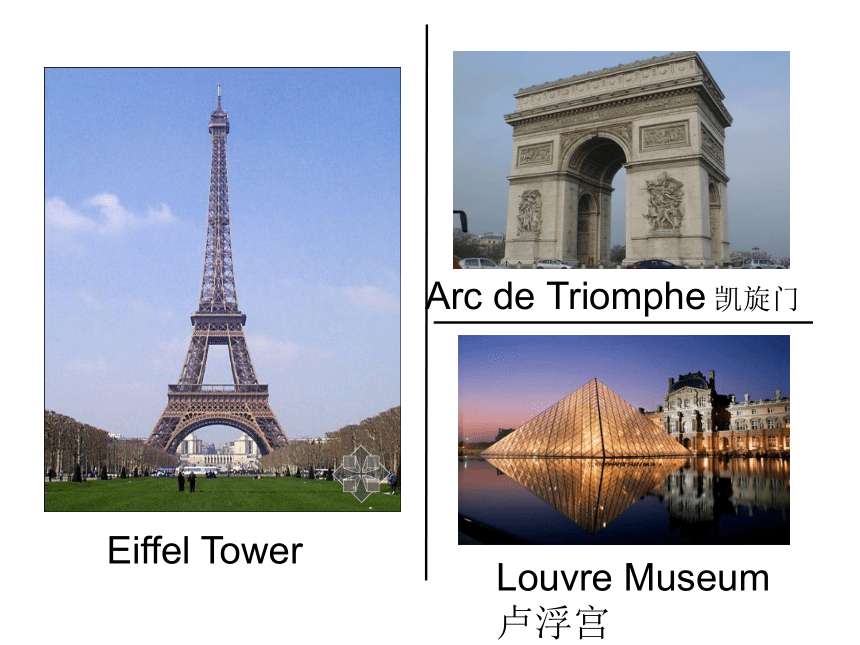
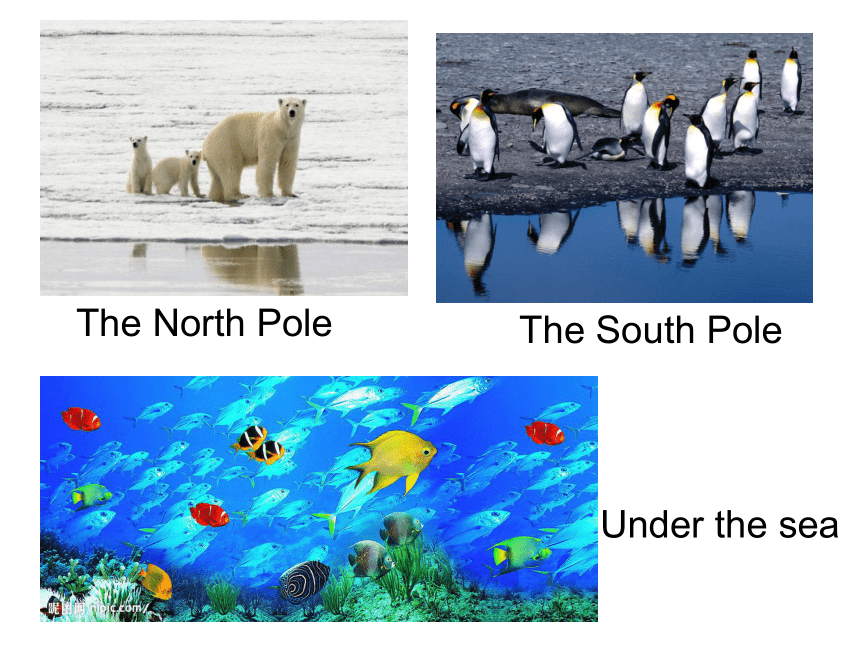
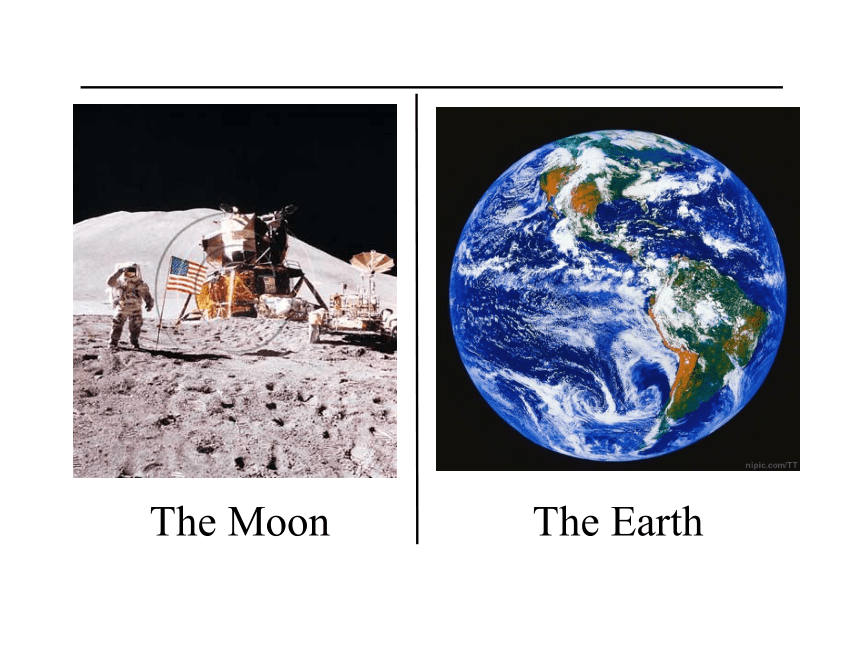
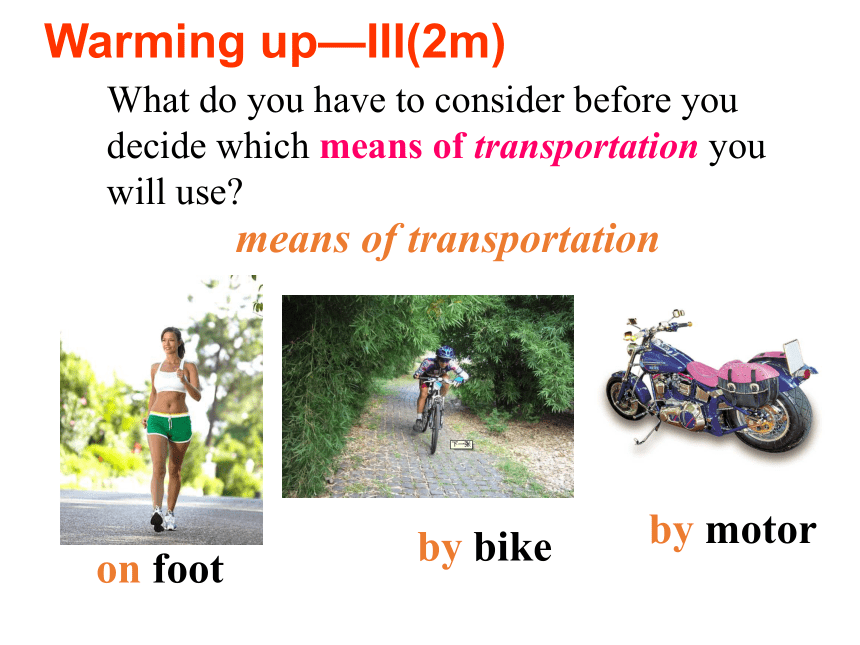
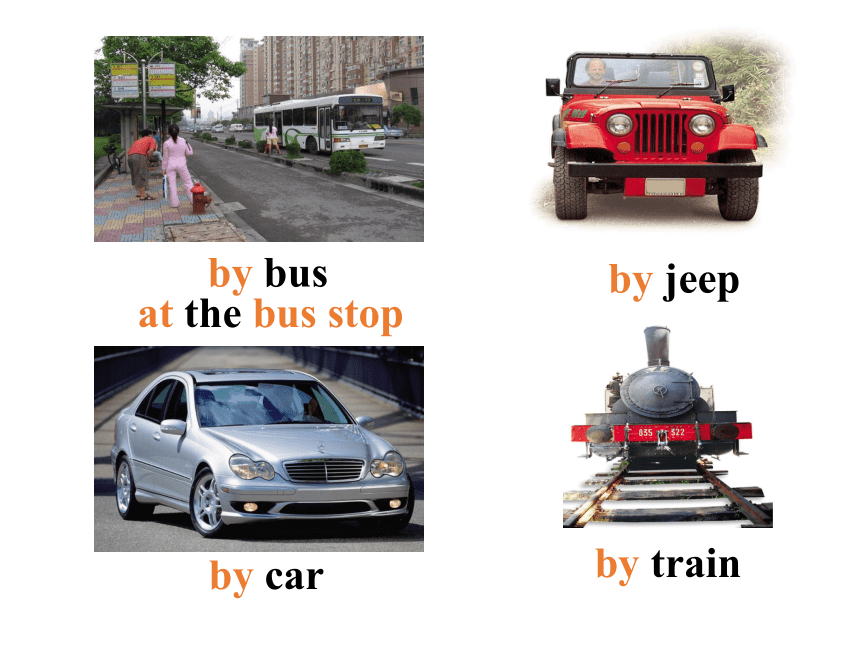
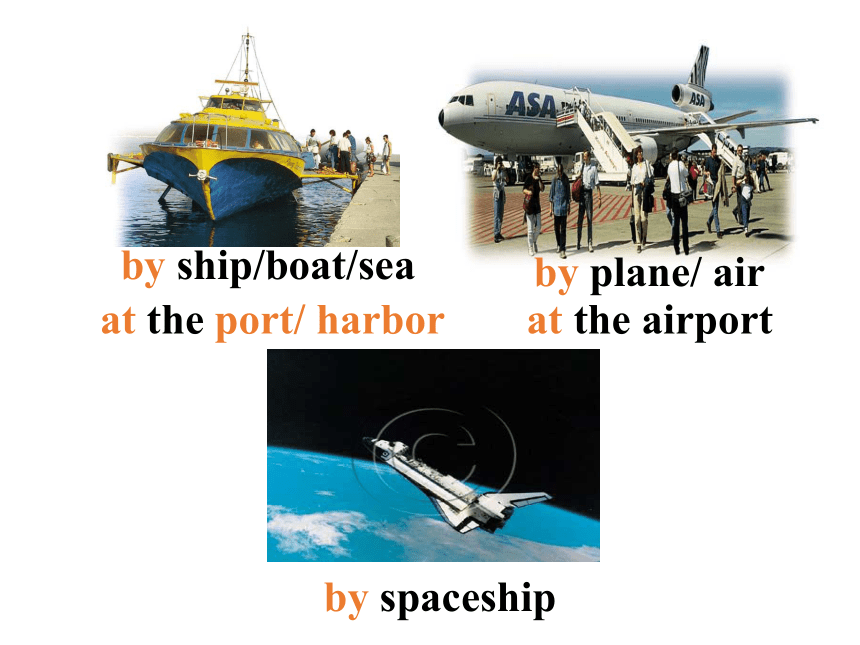
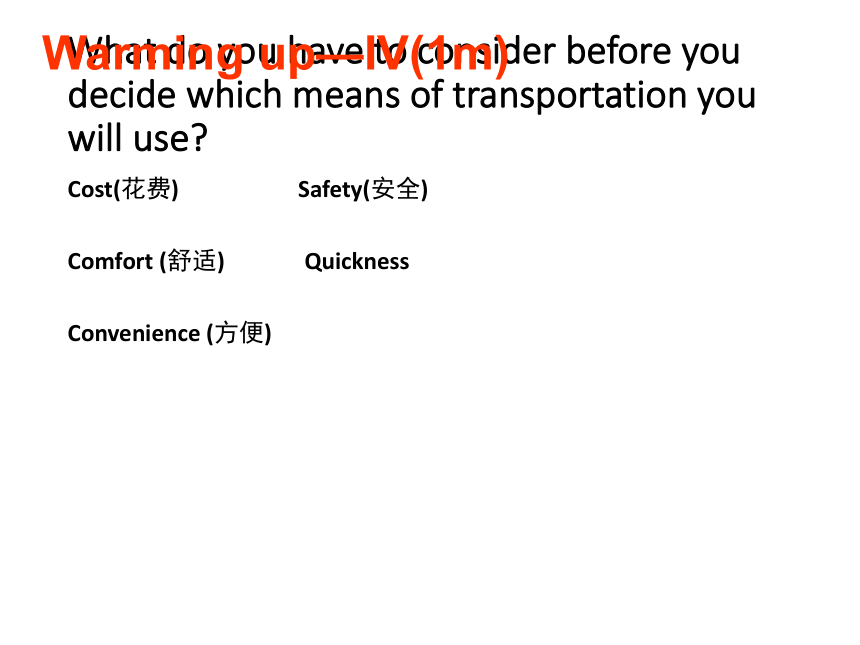
文档简介
课件116张PPT。课时分配Period 1&2
Warming up and ReadingUnit 3
Travel journalIn the National Day and Labor Day, many people including you may prefer to go traveling for a break.1. Why do people like traveling ?
2. If you are going traveling, where are you going?
3. How are you going?Warming up—I (2m)Do you know the following places,
have you ever traveled to them?Warming up –II (2m)Tiananmen SquareThe Great WallForbidden CityThe Heaven TempleEiffel TowerArc de Triomphe 凯旋门
Louvre Museum卢浮宫The North PoleThe South PoleUnder the seaThe MoonThe EarthWhat do you have to consider before you decide which means of transportation you will use?means of transportationon footby bikeby motorWarming up—III(2m)by busat the bus stopby jeepby carby trainby ship/boat/seaat the port/ harborby plane/ airat the airportby spaceshipWhat do you have to consider before you decide which means of transportation you will use?Cost(花费) Safety(安全)
Comfort (舒适) Quickness
Convenience (方便)Warming up—IV(1m)According to the following chart, in pairs ,discuss the fares and decide where to go.Warming up—V (3m)While you are discussing with your partner , ask each other the following questions:When are you leaving?
Where are you going?
How are you going to…?
How long are you staying in…?
When are you arriving in/at…?
When are you coming back?Discuss in groups of four and join the great rivers and their locations in the world in the following form.Pre-reading—I (2m):The great rivers in the world……
How do people who live along a river use it?Brain
go swimmingtravel along a riverto irrigate their fieldsto make electricitystormingPre-reading—II (2m)Have you ever travelled along a river? If you have a chance to travel along a river with your friends, what should you prepare?the basic equipment:good shoes, clothes, and a backpackactivities to doDon’t hike alone.Tell someone where you are going.Bring water and a good map.Pre-reading—III(3m)Watch out for dangers, such as spiders, snakes or poisonous plants.Wear a hat to protect yourself from the sun.Bring a cell phone if you have one.The usage of the equipmentJourney down the MekongreadingSKimmingWho are Wang Kun and Wang Wei?
What was their dream?
Who are Dao Wei and Yu Hang?
Reading—I (1m)1.Who are Wang Kun
and Wang Wei?They are brother
and sister, and both are college students.2. What was their dream? Their dream was
to take a great
bike trip.3.Who are Dao Wei
and Yu Hang?They are Wang Kun’s
cousins who are at a college in Kunming. Scan the passage and then list the countries that the Mekong River flows through.LaosThailandBurmaCambodiaVietnamChinaReading –II (3m)Read and answer the following questions:Where is the source of the Mekong River and which sea does it enter?
What can you see when you travel along the Mekong?
Is it a difficult journey to cycle along the Mekong? Why?Reading –III (4m)
1.The source of the river is in Qinghai
province and it enters the South China sea.2.You can see glacier, rapids ,hills, valleys, waterfalls and plains.
3.Yes. The journey begins at an altitude of more than 5,000metres, where it is hard to breathe and very cold.Read again and get the main idea of each paragraph and tell the reason:Para.1
Wang Kun and Wang Wei’ dream.
Para.2
Wang Wei is stubborn.
Para.3
Preparing for their trip.(Students have to tell the reason why they summarize the main idea like that.)Reading –IV (4m)Work in pairs and fill in the following form:1. taking this trip is a dream to come true.
2. that they will enjoy this trip a lot.
3. they should see a lot of the Mekong.
4. that most of the Mekong will be found in Southeast Asia. 1. they must start in Qinghai where the river begins /see all of the Mekong.
2. that they don’t need to prepare much.1. it is too cold and high to start in Qinghai.
2. that using an atlas is very important. Reading—V (5m)Discussing the text in detailsReading—VI (3m)Taking a great bike trip.the sourceexpensive bikesthe atlasan altitude of more than
5000 metersglacierdeep valleysSoutheast Asiathe South China SeaWhat’s the main idea of the text? The passage tells us a main idea that no success in life merely happens by describing my sister’s and my dream---taking a bike trip and preparations for the trip.In groups of four , summarize the main idea passage and tell why.Reading– VII (3m)Discussion:(Students can have their own opinions.)Do you know some proverbs about it?
What can we learn from the text?Reading—VIII (2m)Life is just a series of trying to make your mind.
生活是由一系列下决心的努力所构成的。
Hitch your wagon to a star.
树雄心,立大志。
Success belongs to the persevering.
胜利属于有毅力者。
No success in life merely happens.
人生中没有什么成功是纯粹偶然得来的。
Homework:
Read the passage and find out the sentences you appreciate and then share with your deskmates.Take a breakPeriod 3
Learning about LanguageUnit 3
Travel journal1.persuade 2.determined
3.is fond of 4. cares about
5. prefer 6. organized
7.fare ,gave in 8. cycle Answer key for Ex. 1 on page20:Answer key for Ex. 2 on page 20: give in 2.liked…better
3.determined 4.item
5.journey 6.journal
7.shortcoming
8.made up his mind I really enjoyed my school field trip in geography. We saw so many beautiful things: a _______ that flowed like a river of ice through a __________ that cut the mountains into parts. We also discovered a river which fell off the mountain and became a wonderful_________. This was even more exciting to see than the _______ where the water seemed to boil. Later we followed the river to a quieter _________and finally into a _______and the sea. Answer key for Ex. 3 on page 20
glacierdeltaplainrapidswaterfallvalleyAnswer key for Ex. 1 in Discovering useful structure:A: Are you working this evening? B: I’m singing songs with my classmates.A: Yes, I do. And we’re giving someB. No. We’re having an English party,
don’t you know?going to do ? performances at the party. What are youAnswer key for Ex. 2 on page 21:R: Miss Wang, I hear that you ________________ along the Mekong River. That’s really exciting . Have you got everything ready?
W: Almost.
R: When are you ____________?
W: Next Monday.
R: How far are you ______________each day?
W: It’s hard to say. If the weather is fine, I think we’ll be able to ride 75 km a day.
are travellingleavingcyclingR: Where are you ______ at night?
W: Usually in our tent, but sometimes in the
villages along the river bank.
R: What happens if you have an accident?
W: Don’t worry. I had some medical training
at my college .Besides , we _____ out insurance to cover any problems.
R: Well, it sounds fine. I hope you will have
a pleasant journey. Thank you for your time. stayingtakingGrammer The Present Continuous Tense for Future Actions(现在进行时表将来) 1. Bob is going to the airport by taxi next week
2. Betty is going off (leaving for) to Guangzhou by plane tomorrow.Grammar--I (5m)Students find the rules by observing the following sentences:3) Jane is staying in Xi’an with her parents.
4) Bob is coming with Betty to see her off.
小结:此四句是现在进行时代替将来时,表示一个最近按计划或安排打算要进行的动作,这类动词通常是瞬间动作,只限于少数动词,常见的有:go, come, leave, sleep, stay, play, do, have, take, get to, see off, etc.
1)How are you feeling today?
2)He is always thinking others.
3)You are always leaving things about.
4)He is always talking big.亲切赞许不满厌烦此四句是现在进行时代替一般现在时,表示一个经常性重复的动作或状态,这时句中常带always 或forever,以表示说话人的某种表情,如赞叹,厌烦,埋怨,等或强调情况的暂时性使其生动。The Present Continuous Tense for the present actions:小结:The plane takes off at 9:30.
My plane leaves at 7:00.
When does the winter holiday begin?
What time does the train leave for Shanghai?
此四句表示将来的事情已经“列入日程” 或按计划将要发生,则用一般现在时代替将来时,但仅限于少数动词begin, go, leave, start, take 等。小结:
(1)表示现在进行时的动作有两种含义:
表示说话的时刻正在进行的动作,常与时间状语now, at the moment等连用。
表示现在阶段正在进行的动作,而不一定是说话时正在进行的动作,常与today, this week, this term等连用。
现在进行时用法归纳 Grammar--II (10m)Ex. Right now it is the summer vacation and I’m helping my dad on the farm.现在是暑假,我在农场帮我爸爸干活。
I’m sitting on a rock near the river with my friends.我和我的朋友们正坐在河边的一块岩石上。
(2)表示反复性或习惯性的动作,常与副词always, continually等连用,表示说话人的赞扬,厌恶,不满,遗憾等的感彩。
Ex. She’s always changing her mind.她老是改变主意。(厌烦)
(3)表示不久之后肯定将发生,或按计划或安排将要做的事(常与未来的时间状语连用),能这样用的动词多是表示“位移”“停留”的,如come, go , leave, arrive, start, begin等。
Ex. Mother is taking us home to see my grandma on Sunday.星期天母亲将带我们回老家看我祖母。
He will write you a letter next week.他下个星期
给你写信。
小结:will/shall+动词原形,表示将来某个时间要发生的动作或存在的状态;或表示自然趋势或非主语意志。
I shall be sixteen years old next month.
下个月我将十六岁了。(自然趋势)
表示将来的时态还有下列的方法:②be going to +动词原形,表示“就要……”,“打算……”或将要发生的事。
Ex. We’re not going to have any classes next week.
表示“位移”的词,如arrive, come, go , leave, start, begin等,可用一般现在时表示将来安排好或即将发生的事。语气比现在进行时更肯定。
Ex. The next train leaves at 9:15.
Practice: Students finish the Ex.3 on P21. After that, students give their own answers.Grammar--III (5m)Translate the following statements:我下个月将去美国。
—————————————————
2.我姑姑在信上说她后天将到我们家。
——————————————————
3.我明天将什么东西也不做。
——————————————————
4.玛丽和我下个星期天去钓鱼。
——————————————————I am going to America next month.Mary and I are going fishing next Sunday.I am not doing anything tomorrow.My aunt said she was arriving at our home the day after tomorrow in the letter.Because the shop___________, all the T-shirts are sold at half price.(2004年浙江高考)
A. has closed down B. closed down
C. is closing down D. had had closed down
2. I’ve won a holiday for two weeks to Florida. I______ my mum.(NMET2001)
am taking B. have taken
C. take D. will have taken 附:高考题CA3. ----Can I join your club, dad?
-----You can when you _______ a bit older. (NMET 1994)
get B. will get
C. are getting D. will have got
4. At this time tomorrow ______over the Atlantic.(2003年北京高考)
we’re going to fly B. we’ll be flying
C. we’ll fly D. we’re to flyABHomework:
To create some situations in which can use continuous tense to express future , and then share with the classmates in next lesson.Take a breakPeriod 4 Reading IIUnit 3
Travel journalJourney Down The MekongA Night In The MountainsPART 2Have you ever been to Tibet?TibetPre-reading--ISpeaking activity:Imagine that you and your partners are planning to make a trip down the Mekong, you need to choose what you will take with you, please have a group of four to discuss which thing you think is the most useful, and which thing is the least useful . Give a reason why do you think so. The following things are for you to choose.Pre-reading IIflashlightumbrellamatchesraincoatcan openerstyrewater bottlecompassradioblankettentmapFirst reading:①When they arrived in Tibet, it was winter then. ( )
②Wang Wei was behind me as usual. ( )
③When we reached a valley, it became warmer.( )
④After supper, we started making a camp. ( )
⑤Wang Kun went to sleep and Wang Wei stayed awake. ( )
⑥There was almost no wind on that night. ( )FFTFFTDecide the following statements are true or false.Reading --ISecond reading:How does Wang Kun feel about the trip now?Reading--IIIn the early eveningAfter supperAt midnightWe _____ __________.Wang Wei ______ __ ____________ but I_______ _______.The sky _______ __________.The stars _____ _______.There was only the sound of______made a campwentsleeptostay awakebecameclearwerebrightfireReading --IIIFind the detailed information from the passage.The end of our JourneyJourney Down The MekongPrediction:Can Wang Wei and Wang Kun’s dream come true?Do you know something about the following countries : Cambodia, Laos, Vietnam? Just say something about them.Capital: Phnom Penh(金边)Capital: Vientiane(万象)Capital: Hanoi(河内) Please find more information from the travel journal to fill the following form:Half the population of CambodiaTwice the population of LaosAlmost seven times the population of CambodiaCool and dry in autumnCooler in the north and much warmer in the southHalf of its people can’t read or writeRice and fishRice and fishRice, fish and fruitHomework:
Do a survey to find out how many students have ever traveled to other provinces and then choose one or two students to interview their feelings during the trip, and report it next class.For a breakPeriod 5
ListeningUnit 3
Travel journalCan you imagine what happened when Wang Kun and Wang Wei travelled down the Mekong river? What happened?see some beautiful scenesmeet something dangerousget lostchatting with the passers-by…….Listen to tape and tick the words you hear on the tape.mountainsDaliTibetThailandLaoshorsesfloodswaterfallsfishcanyonsvalleysforests√√√√√Listening to the tape again and answer the following questions:Which country does the girl come from?
Where does the Mekong River even appear in Laos
What is the Mekong river called in Vietnam?Which country does the girl come from?She is from Laos.2.Where does the Mekong River even appear in Laos?In its national flag.3.What is the Mekong river called
in Vietnam?It’s called “the river of the nine dragons”The water of the rocksThe sea of Laoswashing, fishing and transportmany different animals, plants
and bird speciessmall villages along the riverwaterfalls and rapidsriver passes through mountains and forests; temples, caves and a waterfallListen again to the tape and fill in the chart:Listen to the tape and find out the information to fill in the blank.1.We’re ___________ the Mekong River from its start to where it ___________ the sea.
2. We would be ________ ___________ it. It’s better than a road.
3. The scenery can _________ _______ _________ ___________.
4.It’s a ______________ area so you know it’s very special.followingprotectedtake yourwithoutlostjoinsbreath awayTake a breakPeriod 6
Speaking & WritingUnit 3
Travel journalSpeaking:Introduce a place that you have ever been to to your partner, such as when and how you went there, what you saw, what you did, what impressed you most and so on.Writing :Imagine that you are a friend of Wang Kun .Write a short email asking about Laos In pairs brainstorm some questions.
What is the food like in Laos ?
What do you think of the country?
Which places do you like best in the country? And why?Choose two or three questions and use each as a new paragraph.
How was your trip?
What did you do when …?
Have you met …?
When did you get back?
what kind of things did you see?
Could you give me more details about…?
Could you tell me about…?
You can start your email like this.
My dear brave Wang Lin,
How are three days ?I keep wondering
how you feel about …
Your friend forever
___________ Students write the draft of the letter in the class.Homework:
Revise the composition and then change with the desk mates to correct the mistakes. Next lesson, read the revised and corrected ones to the whole class.Take a breakLanguage Data BankLanguage points for Reading I1.persuade: cause sb by reasoning 说服,劝说 (暗示是成功的,如果未成功则用try to persuade)
(1)persuade sb to do sth 或persuade sb into doing sth:说服某人干某事
How can you persuade him to change his mind/into changing his mind?
Language points for Reading I(2) persuade sb out of doing sth 说服某人不要干某事
Finally, we persuaded her out of traveling by plane.
2.insist: declare firmly, esp.in the face of doubt of opposition 坚持认为;坚决主张
(1)“坚决主张,坚决要求”,后接的宾语从句用陈述语气(表示一个主张或一种看法),即“should+动词原形”,should可省略。
I insisted that he (should) come with us.我坚持主张他跟我们同行。
(2)“坚持说”(表示一个事实),后接的从句用陈述语气,即按需要选择时态
He insisted that he hadn’t stolen the girl’s handbag.他坚持说他注册码偷那女孩的包。
(3) Insist on/upon doing sth 坚持干某事
I insisted on/upon his coming with us.
3.plain: adj“平坦的;清楚的”;n. “平原”
the wide plains of Canada 加拿大的广大平原
in plain language 用简单的语言
4.trip, journey, travel, tour
(1)trip 一般指有目的的短距离的旅行。在现代英语中,trip和journey常可通用,搭配动词有:make, take和go on. 如:
make/ take/ go on a trip/ journey to …到…旅游
on a/ one’s trip/ journey
(2)travel 常用作抽象名词,泛指“旅行,旅游”,指具体旅行时常用复数,但前面不用many或数词。
He came back home after years of foreign travel. 国外多年旅游后,他回了家乡。
(3)tour 指“周游,巡回旅行”,常是访问一系列地方后又回到出发地。
Our American friends are making a tour of Shanghai. 我们的朋友正在对上海进行巡回旅行。
5. It is my sister who first had the idea to cycle along the Mekong River from where it begins to where it ends.(P.18)首先想到要沿湄公河从源头到终点骑车旅游的是我的姐姐。
“It is …that/who...”是强调句型,可强调句子的各个成分(谓语除外),其基本结构为: It is +被强调部分+that(被强调部分是人时也可用who)+其余部分
如:My parents are determined to visit China next year.
It is my parents who/that are determined to visit China next year.(强调主语)
It is China that my parents are determined to visit next year.(强调宾语)
注意它的疑问形式
Is it China that your parents are determined to visit next year?
Where is it that your parents are determined to visit next year?
6.They are Dai and grew up in western Yunnan Province near the Lancang River, the Chinese part of the river that is called the Mekong River before flowing in other countries.(P.18)
他们是傣族人,在云南省西部靠近澜沧江的地方长大的,湄公河在中国境内的这一段叫澜沧江,流到其他国家的就叫湄公河。
the Chinese part of the river that is called the Mekong River before flowing in other countries 是一个名词短语,用来修饰前面的the Langcang River,其中又含有一个定语从句that is called the Mekong River before flowing in other countries.
7.My sister doesn’t care about details.(p.18)
我姐姐是不会考虑细节的。
(1)care about: be worried, concerned or interested 忧虑,关心,惦念
(2)care for: look after; like or love 照顾;喜欢
Who will care for the children if their mother dies?
Would you care for a drink?
(3)care to do : be willing to or wish or like to do 愿意干;想;喜欢干(用于疑问句和否定句)
I don’t care to be seen in his company.
8.Once she has made up her mind, nothing can change it.(P.18) 她一旦下了决心,什么也不能使她改变。
(1)once 可做连词引导状语从句,意为“一旦”,如:
Once you listen to the song, you will never forget it.
(2)once 做副词,意为“一次” for one time;“曾经”in the past.
He goes to the cinema once a week.
This book was once very popular but no one reads it today.
(3)once 的常见短语;at once 立即 all at once 突然 once more 再一次 once a while 偶尔9. To climb the mountain road was hard work but to as we looked around us ,we were surprised by the view.(P.22)
(1)不定式to do 可在句中做主语,注意谓语常用单数。如:
To get up early is good for our health.
在英语表达式中,常用形式主语it 来代替不定式to do做主语,如上句可改为:
It is good for our health to get up early.
It is necessary for us to learn more about science and technology.
It is nice of you to let me know the result.The End
Warming up and ReadingUnit 3
Travel journalIn the National Day and Labor Day, many people including you may prefer to go traveling for a break.1. Why do people like traveling ?
2. If you are going traveling, where are you going?
3. How are you going?Warming up—I (2m)Do you know the following places,
have you ever traveled to them?Warming up –II (2m)Tiananmen SquareThe Great WallForbidden CityThe Heaven TempleEiffel TowerArc de Triomphe 凯旋门
Louvre Museum卢浮宫The North PoleThe South PoleUnder the seaThe MoonThe EarthWhat do you have to consider before you decide which means of transportation you will use?means of transportationon footby bikeby motorWarming up—III(2m)by busat the bus stopby jeepby carby trainby ship/boat/seaat the port/ harborby plane/ airat the airportby spaceshipWhat do you have to consider before you decide which means of transportation you will use?Cost(花费) Safety(安全)
Comfort (舒适) Quickness
Convenience (方便)Warming up—IV(1m)According to the following chart, in pairs ,discuss the fares and decide where to go.Warming up—V (3m)While you are discussing with your partner , ask each other the following questions:When are you leaving?
Where are you going?
How are you going to…?
How long are you staying in…?
When are you arriving in/at…?
When are you coming back?Discuss in groups of four and join the great rivers and their locations in the world in the following form.Pre-reading—I (2m):The great rivers in the world……
How do people who live along a river use it?Brain
go swimmingtravel along a riverto irrigate their fieldsto make electricitystormingPre-reading—II (2m)Have you ever travelled along a river? If you have a chance to travel along a river with your friends, what should you prepare?the basic equipment:good shoes, clothes, and a backpackactivities to doDon’t hike alone.Tell someone where you are going.Bring water and a good map.Pre-reading—III(3m)Watch out for dangers, such as spiders, snakes or poisonous plants.Wear a hat to protect yourself from the sun.Bring a cell phone if you have one.The usage of the equipmentJourney down the MekongreadingSKimmingWho are Wang Kun and Wang Wei?
What was their dream?
Who are Dao Wei and Yu Hang?
Reading—I (1m)1.Who are Wang Kun
and Wang Wei?They are brother
and sister, and both are college students.2. What was their dream? Their dream was
to take a great
bike trip.3.Who are Dao Wei
and Yu Hang?They are Wang Kun’s
cousins who are at a college in Kunming. Scan the passage and then list the countries that the Mekong River flows through.LaosThailandBurmaCambodiaVietnamChinaReading –II (3m)Read and answer the following questions:Where is the source of the Mekong River and which sea does it enter?
What can you see when you travel along the Mekong?
Is it a difficult journey to cycle along the Mekong? Why?Reading –III (4m)
1.The source of the river is in Qinghai
province and it enters the South China sea.2.You can see glacier, rapids ,hills, valleys, waterfalls and plains.
3.Yes. The journey begins at an altitude of more than 5,000metres, where it is hard to breathe and very cold.Read again and get the main idea of each paragraph and tell the reason:Para.1
Wang Kun and Wang Wei’ dream.
Para.2
Wang Wei is stubborn.
Para.3
Preparing for their trip.(Students have to tell the reason why they summarize the main idea like that.)Reading –IV (4m)Work in pairs and fill in the following form:1. taking this trip is a dream to come true.
2. that they will enjoy this trip a lot.
3. they should see a lot of the Mekong.
4. that most of the Mekong will be found in Southeast Asia. 1. they must start in Qinghai where the river begins /see all of the Mekong.
2. that they don’t need to prepare much.1. it is too cold and high to start in Qinghai.
2. that using an atlas is very important. Reading—V (5m)Discussing the text in detailsReading—VI (3m)Taking a great bike trip.the sourceexpensive bikesthe atlasan altitude of more than
5000 metersglacierdeep valleysSoutheast Asiathe South China SeaWhat’s the main idea of the text? The passage tells us a main idea that no success in life merely happens by describing my sister’s and my dream---taking a bike trip and preparations for the trip.In groups of four , summarize the main idea passage and tell why.Reading– VII (3m)Discussion:(Students can have their own opinions.)Do you know some proverbs about it?
What can we learn from the text?Reading—VIII (2m)Life is just a series of trying to make your mind.
生活是由一系列下决心的努力所构成的。
Hitch your wagon to a star.
树雄心,立大志。
Success belongs to the persevering.
胜利属于有毅力者。
No success in life merely happens.
人生中没有什么成功是纯粹偶然得来的。
Homework:
Read the passage and find out the sentences you appreciate and then share with your deskmates.Take a breakPeriod 3
Learning about LanguageUnit 3
Travel journal1.persuade 2.determined
3.is fond of 4. cares about
5. prefer 6. organized
7.fare ,gave in 8. cycle Answer key for Ex. 1 on page20:Answer key for Ex. 2 on page 20: give in 2.liked…better
3.determined 4.item
5.journey 6.journal
7.shortcoming
8.made up his mind I really enjoyed my school field trip in geography. We saw so many beautiful things: a _______ that flowed like a river of ice through a __________ that cut the mountains into parts. We also discovered a river which fell off the mountain and became a wonderful_________. This was even more exciting to see than the _______ where the water seemed to boil. Later we followed the river to a quieter _________and finally into a _______and the sea. Answer key for Ex. 3 on page 20
glacierdeltaplainrapidswaterfallvalleyAnswer key for Ex. 1 in Discovering useful structure:A: Are you working this evening? B: I’m singing songs with my classmates.A: Yes, I do. And we’re giving someB. No. We’re having an English party,
don’t you know?going to do ? performances at the party. What are youAnswer key for Ex. 2 on page 21:R: Miss Wang, I hear that you ________________ along the Mekong River. That’s really exciting . Have you got everything ready?
W: Almost.
R: When are you ____________?
W: Next Monday.
R: How far are you ______________each day?
W: It’s hard to say. If the weather is fine, I think we’ll be able to ride 75 km a day.
are travellingleavingcyclingR: Where are you ______ at night?
W: Usually in our tent, but sometimes in the
villages along the river bank.
R: What happens if you have an accident?
W: Don’t worry. I had some medical training
at my college .Besides , we _____ out insurance to cover any problems.
R: Well, it sounds fine. I hope you will have
a pleasant journey. Thank you for your time. stayingtakingGrammer The Present Continuous Tense for Future Actions(现在进行时表将来) 1. Bob is going to the airport by taxi next week
2. Betty is going off (leaving for) to Guangzhou by plane tomorrow.Grammar--I (5m)Students find the rules by observing the following sentences:3) Jane is staying in Xi’an with her parents.
4) Bob is coming with Betty to see her off.
小结:此四句是现在进行时代替将来时,表示一个最近按计划或安排打算要进行的动作,这类动词通常是瞬间动作,只限于少数动词,常见的有:go, come, leave, sleep, stay, play, do, have, take, get to, see off, etc.
1)How are you feeling today?
2)He is always thinking others.
3)You are always leaving things about.
4)He is always talking big.亲切赞许不满厌烦此四句是现在进行时代替一般现在时,表示一个经常性重复的动作或状态,这时句中常带always 或forever,以表示说话人的某种表情,如赞叹,厌烦,埋怨,等或强调情况的暂时性使其生动。The Present Continuous Tense for the present actions:小结:The plane takes off at 9:30.
My plane leaves at 7:00.
When does the winter holiday begin?
What time does the train leave for Shanghai?
此四句表示将来的事情已经“列入日程” 或按计划将要发生,则用一般现在时代替将来时,但仅限于少数动词begin, go, leave, start, take 等。小结:
(1)表示现在进行时的动作有两种含义:
表示说话的时刻正在进行的动作,常与时间状语now, at the moment等连用。
表示现在阶段正在进行的动作,而不一定是说话时正在进行的动作,常与today, this week, this term等连用。
现在进行时用法归纳 Grammar--II (10m)Ex. Right now it is the summer vacation and I’m helping my dad on the farm.现在是暑假,我在农场帮我爸爸干活。
I’m sitting on a rock near the river with my friends.我和我的朋友们正坐在河边的一块岩石上。
(2)表示反复性或习惯性的动作,常与副词always, continually等连用,表示说话人的赞扬,厌恶,不满,遗憾等的感彩。
Ex. She’s always changing her mind.她老是改变主意。(厌烦)
(3)表示不久之后肯定将发生,或按计划或安排将要做的事(常与未来的时间状语连用),能这样用的动词多是表示“位移”“停留”的,如come, go , leave, arrive, start, begin等。
Ex. Mother is taking us home to see my grandma on Sunday.星期天母亲将带我们回老家看我祖母。
He will write you a letter next week.他下个星期
给你写信。
小结:will/shall+动词原形,表示将来某个时间要发生的动作或存在的状态;或表示自然趋势或非主语意志。
I shall be sixteen years old next month.
下个月我将十六岁了。(自然趋势)
表示将来的时态还有下列的方法:②be going to +动词原形,表示“就要……”,“打算……”或将要发生的事。
Ex. We’re not going to have any classes next week.
表示“位移”的词,如arrive, come, go , leave, start, begin等,可用一般现在时表示将来安排好或即将发生的事。语气比现在进行时更肯定。
Ex. The next train leaves at 9:15.
Practice: Students finish the Ex.3 on P21. After that, students give their own answers.Grammar--III (5m)Translate the following statements:我下个月将去美国。
—————————————————
2.我姑姑在信上说她后天将到我们家。
——————————————————
3.我明天将什么东西也不做。
——————————————————
4.玛丽和我下个星期天去钓鱼。
——————————————————I am going to America next month.Mary and I are going fishing next Sunday.I am not doing anything tomorrow.My aunt said she was arriving at our home the day after tomorrow in the letter.Because the shop___________, all the T-shirts are sold at half price.(2004年浙江高考)
A. has closed down B. closed down
C. is closing down D. had had closed down
2. I’ve won a holiday for two weeks to Florida. I______ my mum.(NMET2001)
am taking B. have taken
C. take D. will have taken 附:高考题CA3. ----Can I join your club, dad?
-----You can when you _______ a bit older. (NMET 1994)
get B. will get
C. are getting D. will have got
4. At this time tomorrow ______over the Atlantic.(2003年北京高考)
we’re going to fly B. we’ll be flying
C. we’ll fly D. we’re to flyABHomework:
To create some situations in which can use continuous tense to express future , and then share with the classmates in next lesson.Take a breakPeriod 4 Reading IIUnit 3
Travel journalJourney Down The MekongA Night In The MountainsPART 2Have you ever been to Tibet?TibetPre-reading--ISpeaking activity:Imagine that you and your partners are planning to make a trip down the Mekong, you need to choose what you will take with you, please have a group of four to discuss which thing you think is the most useful, and which thing is the least useful . Give a reason why do you think so. The following things are for you to choose.Pre-reading IIflashlightumbrellamatchesraincoatcan openerstyrewater bottlecompassradioblankettentmapFirst reading:①When they arrived in Tibet, it was winter then. ( )
②Wang Wei was behind me as usual. ( )
③When we reached a valley, it became warmer.( )
④After supper, we started making a camp. ( )
⑤Wang Kun went to sleep and Wang Wei stayed awake. ( )
⑥There was almost no wind on that night. ( )FFTFFTDecide the following statements are true or false.Reading --ISecond reading:How does Wang Kun feel about the trip now?Reading--IIIn the early eveningAfter supperAt midnightWe _____ __________.Wang Wei ______ __ ____________ but I_______ _______.The sky _______ __________.The stars _____ _______.There was only the sound of______made a campwentsleeptostay awakebecameclearwerebrightfireReading --IIIFind the detailed information from the passage.The end of our JourneyJourney Down The MekongPrediction:Can Wang Wei and Wang Kun’s dream come true?Do you know something about the following countries : Cambodia, Laos, Vietnam? Just say something about them.Capital: Phnom Penh(金边)Capital: Vientiane(万象)Capital: Hanoi(河内) Please find more information from the travel journal to fill the following form:Half the population of CambodiaTwice the population of LaosAlmost seven times the population of CambodiaCool and dry in autumnCooler in the north and much warmer in the southHalf of its people can’t read or writeRice and fishRice and fishRice, fish and fruitHomework:
Do a survey to find out how many students have ever traveled to other provinces and then choose one or two students to interview their feelings during the trip, and report it next class.For a breakPeriod 5
ListeningUnit 3
Travel journalCan you imagine what happened when Wang Kun and Wang Wei travelled down the Mekong river? What happened?see some beautiful scenesmeet something dangerousget lostchatting with the passers-by…….Listen to tape and tick the words you hear on the tape.mountainsDaliTibetThailandLaoshorsesfloodswaterfallsfishcanyonsvalleysforests√√√√√Listening to the tape again and answer the following questions:Which country does the girl come from?
Where does the Mekong River even appear in Laos
What is the Mekong river called in Vietnam?Which country does the girl come from?She is from Laos.2.Where does the Mekong River even appear in Laos?In its national flag.3.What is the Mekong river called
in Vietnam?It’s called “the river of the nine dragons”The water of the rocksThe sea of Laoswashing, fishing and transportmany different animals, plants
and bird speciessmall villages along the riverwaterfalls and rapidsriver passes through mountains and forests; temples, caves and a waterfallListen again to the tape and fill in the chart:Listen to the tape and find out the information to fill in the blank.1.We’re ___________ the Mekong River from its start to where it ___________ the sea.
2. We would be ________ ___________ it. It’s better than a road.
3. The scenery can _________ _______ _________ ___________.
4.It’s a ______________ area so you know it’s very special.followingprotectedtake yourwithoutlostjoinsbreath awayTake a breakPeriod 6
Speaking & WritingUnit 3
Travel journalSpeaking:Introduce a place that you have ever been to to your partner, such as when and how you went there, what you saw, what you did, what impressed you most and so on.Writing :Imagine that you are a friend of Wang Kun .Write a short email asking about Laos In pairs brainstorm some questions.
What is the food like in Laos ?
What do you think of the country?
Which places do you like best in the country? And why?Choose two or three questions and use each as a new paragraph.
How was your trip?
What did you do when …?
Have you met …?
When did you get back?
what kind of things did you see?
Could you give me more details about…?
Could you tell me about…?
You can start your email like this.
My dear brave Wang Lin,
How are three days ?I keep wondering
how you feel about …
Your friend forever
___________ Students write the draft of the letter in the class.Homework:
Revise the composition and then change with the desk mates to correct the mistakes. Next lesson, read the revised and corrected ones to the whole class.Take a breakLanguage Data BankLanguage points for Reading I1.persuade: cause sb by reasoning 说服,劝说 (暗示是成功的,如果未成功则用try to persuade)
(1)persuade sb to do sth 或persuade sb into doing sth:说服某人干某事
How can you persuade him to change his mind/into changing his mind?
Language points for Reading I(2) persuade sb out of doing sth 说服某人不要干某事
Finally, we persuaded her out of traveling by plane.
2.insist: declare firmly, esp.in the face of doubt of opposition 坚持认为;坚决主张
(1)“坚决主张,坚决要求”,后接的宾语从句用陈述语气(表示一个主张或一种看法),即“should+动词原形”,should可省略。
I insisted that he (should) come with us.我坚持主张他跟我们同行。
(2)“坚持说”(表示一个事实),后接的从句用陈述语气,即按需要选择时态
He insisted that he hadn’t stolen the girl’s handbag.他坚持说他注册码偷那女孩的包。
(3) Insist on/upon doing sth 坚持干某事
I insisted on/upon his coming with us.
3.plain: adj“平坦的;清楚的”;n. “平原”
the wide plains of Canada 加拿大的广大平原
in plain language 用简单的语言
4.trip, journey, travel, tour
(1)trip 一般指有目的的短距离的旅行。在现代英语中,trip和journey常可通用,搭配动词有:make, take和go on. 如:
make/ take/ go on a trip/ journey to …到…旅游
on a/ one’s trip/ journey
(2)travel 常用作抽象名词,泛指“旅行,旅游”,指具体旅行时常用复数,但前面不用many或数词。
He came back home after years of foreign travel. 国外多年旅游后,他回了家乡。
(3)tour 指“周游,巡回旅行”,常是访问一系列地方后又回到出发地。
Our American friends are making a tour of Shanghai. 我们的朋友正在对上海进行巡回旅行。
5. It is my sister who first had the idea to cycle along the Mekong River from where it begins to where it ends.(P.18)首先想到要沿湄公河从源头到终点骑车旅游的是我的姐姐。
“It is …that/who...”是强调句型,可强调句子的各个成分(谓语除外),其基本结构为: It is +被强调部分+that(被强调部分是人时也可用who)+其余部分
如:My parents are determined to visit China next year.
It is my parents who/that are determined to visit China next year.(强调主语)
It is China that my parents are determined to visit next year.(强调宾语)
注意它的疑问形式
Is it China that your parents are determined to visit next year?
Where is it that your parents are determined to visit next year?
6.They are Dai and grew up in western Yunnan Province near the Lancang River, the Chinese part of the river that is called the Mekong River before flowing in other countries.(P.18)
他们是傣族人,在云南省西部靠近澜沧江的地方长大的,湄公河在中国境内的这一段叫澜沧江,流到其他国家的就叫湄公河。
the Chinese part of the river that is called the Mekong River before flowing in other countries 是一个名词短语,用来修饰前面的the Langcang River,其中又含有一个定语从句that is called the Mekong River before flowing in other countries.
7.My sister doesn’t care about details.(p.18)
我姐姐是不会考虑细节的。
(1)care about: be worried, concerned or interested 忧虑,关心,惦念
(2)care for: look after; like or love 照顾;喜欢
Who will care for the children if their mother dies?
Would you care for a drink?
(3)care to do : be willing to or wish or like to do 愿意干;想;喜欢干(用于疑问句和否定句)
I don’t care to be seen in his company.
8.Once she has made up her mind, nothing can change it.(P.18) 她一旦下了决心,什么也不能使她改变。
(1)once 可做连词引导状语从句,意为“一旦”,如:
Once you listen to the song, you will never forget it.
(2)once 做副词,意为“一次” for one time;“曾经”in the past.
He goes to the cinema once a week.
This book was once very popular but no one reads it today.
(3)once 的常见短语;at once 立即 all at once 突然 once more 再一次 once a while 偶尔9. To climb the mountain road was hard work but to as we looked around us ,we were surprised by the view.(P.22)
(1)不定式to do 可在句中做主语,注意谓语常用单数。如:
To get up early is good for our health.
在英语表达式中,常用形式主语it 来代替不定式to do做主语,如上句可改为:
It is good for our health to get up early.
It is necessary for us to learn more about science and technology.
It is nice of you to let me know the result.The End
